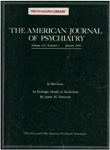The methylphenidate test for differentiating desipramine-responsive from nortriptyline-responsive depression
Abstract
Monitoring tricyclic antidepressant concentrations in the plasma of 43 patients with major depressive disorders indicated that some responded to imipramine or desipramine but not to amitriptyline or nortriptyline, or vice versa, even though plasma levels were within therapeutic ranges. Mood elevation by methylphenidate predicted marked improvement from treatment with imipramine or desipramine but not with amitriptyline or nortriptyline. When methylphenidate failed to improve mood, patients responded to amitriptyline or nortriptyline but not to desipramine. These results suggest differential drug responses with different tricyclic antidepressants, the clinical utility of the methylphenidate test, and the heterogeneity of depressions. The authors question the mechanism of action of nortriptyline via blockade of norepinephrine reuptake.
Access content
To read the fulltext, please use one of the options below to sign in or purchase access.- Personal login
- Institutional Login
- Sign in via OpenAthens
- Register for access
-
Please login/register if you wish to pair your device and check access availability.
Not a subscriber?
PsychiatryOnline subscription options offer access to the DSM-5 library, books, journals, CME, and patient resources. This all-in-one virtual library provides psychiatrists and mental health professionals with key resources for diagnosis, treatment, research, and professional development.
Need more help? PsychiatryOnline Customer Service may be reached by emailing [email protected] or by calling 800-368-5777 (in the U.S.) or 703-907-7322 (outside the U.S.).



